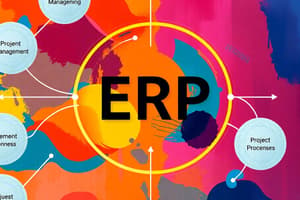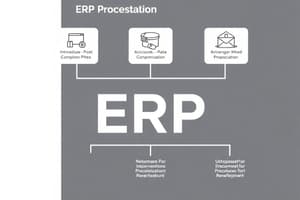Podcast
Questions and Answers
What is essential for the successful implementation of change management in organizations?
What is essential for the successful implementation of change management in organizations?
- Support from top management and skilled change management team (correct)
- Training of only the end-users
- Involvement of external consultants
- Support from middle management
Which phase in the Fast Track methodology involves defining project scope?
Which phase in the Fast Track methodology involves defining project scope?
- Redesign
- Scoping and Planning (correct)
- Testing and Delivery
- Visioning and Targeting
What does the Accelerated SAP (ASAP) method emphasize during the Business Blueprint phase?
What does the Accelerated SAP (ASAP) method emphasize during the Business Blueprint phase?
- Delivering a complete toolkit of predefined business processes (correct)
- Real-time feedback from end-users
- Analyzing the organization’s financial performance
- Customization of the R3 system
In the context of project management, which area focuses on risk management and quality assurance?
In the context of project management, which area focuses on risk management and quality assurance?
What is the focus of the Integration Test Planning phase in the Fast Track methodology?
What is the focus of the Integration Test Planning phase in the Fast Track methodology?
Which aspect is considered under the Success Dimension in the Total Solution methodology?
Which aspect is considered under the Success Dimension in the Total Solution methodology?
What is a key activity in the Final Preparation phase of the ASAP method?
What is a key activity in the Final Preparation phase of the ASAP method?
Which phase in the Business Integration Methodology focuses on defining appropriate strategies for competitive advantage?
Which phase in the Business Integration Methodology focuses on defining appropriate strategies for competitive advantage?
What is the primary focus during the Implementation Stage of the ERP life cycle?
What is the primary focus during the Implementation Stage of the ERP life cycle?
Which stage involves defining the characteristics of ERP implementation?
Which stage involves defining the characteristics of ERP implementation?
What is essential for a successful ERP project from its initiation?
What is essential for a successful ERP project from its initiation?
During which stage of the ERP life cycle are embedded processes and user interfaces designed?
During which stage of the ERP life cycle are embedded processes and user interfaces designed?
What major activity occurs during the Operation Stage of the ERP life cycle?
What major activity occurs during the Operation Stage of the ERP life cycle?
Which of the following best describes the role of change management in ERP implementations?
Which of the following best describes the role of change management in ERP implementations?
What task is performed during the Acquisition & Development Stage of the ERP life cycle?
What task is performed during the Acquisition & Development Stage of the ERP life cycle?
What approach is taken to convert to the new ERP system during the Implementation Stage?
What approach is taken to convert to the new ERP system during the Implementation Stage?
Flashcards
ERP Life Cycle Stages
ERP Life Cycle Stages
The phases involved in implementing an Enterprise Resource Planning (ERP) system, from planning to operation.
Scope and Commitment Stage
Scope and Commitment Stage
The initial phase where the ERP project's scope, resources, and timeline are defined and management commitment is secured.
Analysis and Design Stage
Analysis and Design Stage
The phase where user needs are analyzed, and the ERP system design is developed, including process mapping, data conversion plans and training.
Acquisition & Development Stage
Acquisition & Development Stage
Signup and view all the flashcards
Implementation Stage
Implementation Stage
Signup and view all the flashcards
Operation Stage
Operation Stage
Signup and view all the flashcards
Change Management
Change Management
Signup and view all the flashcards
ERP Conversion Approaches
ERP Conversion Approaches
Signup and view all the flashcards
ERP Implementation Methodologies
ERP Implementation Methodologies
Signup and view all the flashcards
Total Solution (Ernst & Young)
Total Solution (Ernst & Young)
Signup and view all the flashcards
Fast Track (Deloitte)
Fast Track (Deloitte)
Signup and view all the flashcards
Accelerated SAP (ASAP)
Accelerated SAP (ASAP)
Signup and view all the flashcards
Business Integration Methodology (Accenture)
Business Integration Methodology (Accenture)
Signup and view all the flashcards
Change Management Support (SMEs)
Change Management Support (SMEs)
Signup and view all the flashcards
Project Phases (ERP)
Project Phases (ERP)
Signup and view all the flashcards
Organizational Readiness (ERP)
Organizational Readiness (ERP)
Signup and view all the flashcards
Study Notes
Traditional ERP Life Cycle
-
Scope and Commitment Stage: Develops ERP implementation scope, resource, and timeline. Defines ERP characteristics. Creates long-term vision and short-term implementation plan, along with securing top management commitment.
-
Analysis and Design Stage: Software decision, consultant/SME selection, user requirement analysis, mapping current/ERP processes, change management plan creation, identifying embedded processes, designing user interfaces, customizable reports, data conversion, system conversion, and training.
-
Acquisition & Development Stage: Acquires software license, builds production version, executes gap analysis tasks, change management team guides business process changes, data migration, and configures ERP system security.
-
Implementation Stage: System installation, system release to end-users, monitoring system release to users, utilizing system conversion methods (Phased, Pilot, Parallel, Direct Cut), funneling user feedback to post-implementation support.
-
Operation Stage: Knowledge transfer (handover), support migration to help desk, training new users, managing system updates (new releases/patches/upgrades), and managing software contracts with ERP vendor.
Role of Change Management
- Crucial for successful ERP implementation.
- Vision for change management needs articulation from the outset, with continuous revision, monitoring, and implementation.
- SMEs and internal users play a role in guiding the implementation team.
- Top management support and skilled change management team are essential.
Methodologies Used in ERP Implementation
Total Solution (Ernst & Young, LLP)
- Value Proposition: Does the solution make business sense?
- Reality Check: Is the organization ready for change?
- Aligned Approach: Sets expectations delivering short-term and long-term value.
- Success Dimension: Balances people, skills, methods, and management in the team.
- Delivering Value: Measures results and celebrates success.
Fast Track (Deloitte & Touche)
- Scoping and Planning: Project definition and project planning initiation
- Visioning and Targeting: Needs assessment, vision identification, "As-is" modeling
- Redesign: "To-be" modeling, software design & development
- Configuration: Software development, integration test planning
- Testing and Delivery: Integration testing, business and system delivery
- Areas: Project Management, IT Architecture, Process/Systems Integrity, Change Leadership, and Training/Documentation
Accelerated SAP (ASAP)
- Project Preparation: Proper planning and assessing organizational readiness.
- Business Blueprint: Engineer delivers predefined business processes.
- Realization: Configures the R/3 system based on the business blueprint.
- Final Preparation: Fine-tunes the R/3 system.
- Go-Live and Support: Develops ongoing benefit review procedures and metrics.
Business Integration Methodology (Accenture)
- Planning Phase: Defines strategies for competitive advantage and stakeholder value. (Note: "Del..." is incomplete)
Studying That Suits You
Use AI to generate personalized quizzes and flashcards to suit your learning preferences.
Description
This quiz explores the stages of the Traditional ERP Life Cycle, including scope and commitment, analysis and design, acquisition and development, and implementation. Understand the critical components and steps involved in successfully implementing ERP systems in organizations.




